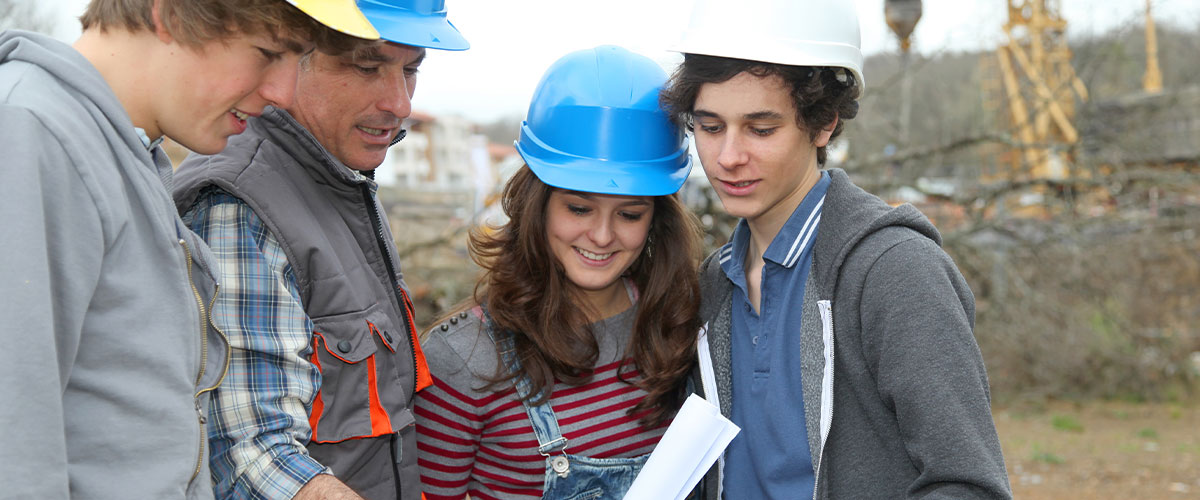UWTSD Home-Study With Us-Undergraduate Courses- Civil Engineering (BSc, HND, HNC)
This programme is subject to revalidation.
This Civil Engineering degree course is built around five main areas: materials, structures, geotechnics, surveying and construction management. All of these areas are identified as core subjects required in the civil engineering curriculum, according to the Joint Board of Moderators for accredited degree programmes, if you are planning to set out on a path towards becoming a chartered engineer.
工作人员have a wide array of construction industry links developed as practitioners, and as members of professional bodies, as well as through industry collaborations and research projects in different fields of civil engineering.
Close links are developed with the Construction Industry Training Board (CITB), Construction Wales Innovation Centre (CWIC) and Chartered Institute of Building (CIOB). This provides a wide range of knowledge and experience to support your course, and good employability prospects as civil engineers with the scope to diversify into related fields such as building and site surveyors.
Subjects such as transport infrastructure engineering or environmental engineering are considered in specific modules. The programme is delivered in combination with project-based learning using real case studies and scenarios, site visits, practical exercises in surveying and laboratory testing.
Civil Engineering (BSc)
UCAS Code:CEN1
Apply via UCAS
Civil Engineering (HND)
UCAS Code:CEN8
Apply via UCAS
Civil Engineering (HNC)
UCAS Code:CEN9
Apply via UCAS
Full-time applicants should apply through UCAS. Part-time applicants should apply through the University.
Book an Open Day Request Information
Tuition Fees 2023/24:
Home (Full-time):£9,000per year
Overseas (Full-time):£13,500per year
Why choose this course?
- We have a unique progression from pre-degree, BSc to MSc and research degrees which engages directly with employability and solutions for industrial issues.
- The School is embedded in Wales’s construction industry with close links to industrial organisations e.g. CIOB, RICS, CABE, CITB.
- Centre of excellence and innovation for Wales and the South West (CWIC).
- 工作人员are members of the Wales Regional Centre of Expertise, Research and Innovation group on the Circular Economy.
- Direct links and projects with TRADA.
- Live sustainable construction projects with Down to Earth.
- Strong industry links with waste management and managing construction and demolition waste.
- Practitioners from industry teaching as lecturers with a high level of experience.
- High rates of employability amongst our students after their studies.
- Cross-disciplinary teaching and research for the Well-being of Future Generations (Wales) Act 2015.
- MSc programmes in Property and Facilities Management, Sustainable Construction and Environmental Conservation and Management.
What you will learn
As Caroline Gumble (the CEO of the CIOB in 2020) states, “The construction industry affects everyone, influencing productivity and wellbeing, creating the homes, hospitals, schools, workplaces, and infrastructure essential for a good quality of life,” and goes on to say that construction is a “highly complex but extremely exciting and innovative industry”.
Those working on construction sites account for 6% of the UK economic output, but if you also include the services such as quantity surveyors, architects and engineers, as well as plant hire and building suppliers, then the output is closer to double. This is a large percentage of the UK economic output. The construction industry provides jobs for about 2.3 million people, which is over 7% of the UK total. Construction jobs are also well-paid, earning on average 5% more than other industries, and graduates in this field have opportunities in the UK and overseas in a variety of rewarding careers.
Year One – Level 4 (HNC, HND & BSc)
- Digital Surveying (20 credits; compulsory)
- Engineering Mathematics and Structures (20 credits; compulsory)
- Fundamentals of Construction Technology (20 credits; compulsory)
- 合同和法律Responsibilitie介绍s within the Built Environment (20 credits; compulsory)
- Professional Skills and Health & Safety in Construction (20 credits; compulsory)
- Working with Digital Technologies & BIM (20 credits; compulsory).
Year Two – Level 5 (HND & BSc)
- Civil Engineering Technology (20 credits; compulsory)
- Geotechnical & Foundation Technology (20 credits; compulsory)
- Materials Engineering (20 credits; compulsory)
- Project Planning for Construction (20 credits; compulsory)
- The Management of Sustainable Construction (20 credits; compulsory)
- Work Based Project (20 credits; compulsory).
Year Three – Level 6 (BSc)
- Advanced Construction & Civil Engineering Technology (20 credits; compulsory)
- Construction Management (20 credits; optional)
- Independent Project (40 credits; compulsory;Graduate Attributes Frameworkmodule)
- Integrated Group Project (20 credits; compulsory)
- 结构体ural Design (20 credits; compulsory).
Assessments used within these programmes are normally formative or summative. In the former assessment is designed to ensure students become aware of their strengths and weaknesses.
Typically, such assessment will take the form of practical exercises where a more hands-on approach shows student’s ability on a range of activities. Traditional formal time-constrained assessment is by means of tests and examinations, normally of two-hour duration.
Examinations are a traditional method of verifying that the work produced is the students’ own work. To help authenticate student coursework, some modules require that the student and lecturer negotiate the topic for assessment on an individual basis, allowing the lecturer to monitor progress.
Some modules where the assessment is research-based require students to verbally/visually present the research results to the lecturer and peers, followed by a question and answer session.
Such assessment strategies are in accord with the learning and teaching strategies employed by the team, that is, where the aim is to generate work that is mainly student-driven, individual, reflective and where appropriate, vocationally-orientated.
Feedback to students will occur early in the study period and continue over the whole study session thereby allowing for greater value added to the student’s learning.
This Framework aims to develop your professional skills and competence alongside your academic subject knowledge. You’ll study up to 40 credits per level throughout your programme from the Graduate Attributes Framework.
The Graduate Attribute modules are designed to enable you to develop, and evidence, a range of career-focused skills related to your subject area. These skills include digital competency, research and project management, as well as such personal competencies as communication, creativity, self-reflection, resilience and problem-solving.
- Find out more about theGraduate Attributes Framework
Learn More about our Construction Degrees
Brand New Waterfront Campus
关键信息
- Dr Deborah Hughes
- Trevor Francis
- Allan Lee Nantel
- Mrs Lara Hopkinson
- Lindsay Richards
- Gavin M Traylor
Civil Engineering (BSc)
You will need 96 UCAS Tariff points from A levels or their equivalent (previously 240 UCAS tariff points)
Civil Engineering (HND)
You will need 48 UCAS Tariff points from A levels or their equivalent (previously 120 UCAS tariff points)
Civil Engineering (HNC)
You will need 32 UCAS Tariff points from A levels or their equivalent (previously 80 UCAS tariff points)
Grades are important; however, our offers are not solely based on academic results. We are interested in creative people that demonstrate a strong commitment to their chosen subject area and therefore we welcome applications from individuals from a wide range of backgrounds. To assess student suitability for their chosen course we normally arrange interviews for all applicants at which your skills, achievements and life experience will be considered as well as your qualifications.
This programme will meet industry demands and in doing so provide a sound intellectually demanding vocational learning experience linked to industry and professional bodies, a requirement that satisfies the needs of both students and employers. Furthermore, the programme team has developed the aims of the course to enhance the development of technical competence and training at a level which is capable of meeting the industry’s current requirements for middle management.
The Civil Engineering pathway is formulated to provide the graduate with a range of skills that will enable them to enter positions within both client and contracting organisations. The diverse nature of the pathway, focusing on both environmental matters and civil engineering matters, offers students a range of possible career opportunities within these fields.
Module outcomes address concerns such as sustainability, energy efficiency and facilities management along with the more familiar outcomes such as management theories, literacy, problem-solving and client needs. Supplementing these are a range of higher-level skills which have been designed to integrate with module outcomes.
It is possible to complete this programme of study without any additional costs.
Students may wish to purchase materials for modules, such as a major project but this is not a requirement and will have no bearing on the final grade.
“Throughout my study, all of my lecturers have been very helpful and are always approachable. This hasn't been more apparent than during the COVID-19 pandemic. The University acted quickly to find alternatives to lectures and has created an exceptional online facility to continue to deliver our course content. This new platform provides an element of flexibility, which is greatly appreciated during these unprecedented times. My lecturers have gone the extra mile to provide support not only from an academic perspective, but to check on our health and well-being also.”
网络分析师马修振动筛Dwr经营户威尔士Water, HNC Civil Engineering.
"I have been in the civil industry since I was nineteen, so being given the chance to further my education has been an excellent experience. Lecturers have been easy to get on with, and to contact during my time here, and are always willing to meet up to help you out."
Lewis Evans, BSc Civil Engineering.
To find out about scholarships, bursaries and other funding opportunities that are available please visit ourBursaries and Scholarshipssection.
Visit ourAccommodationsection to find out more.








